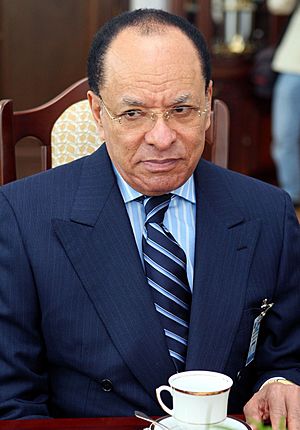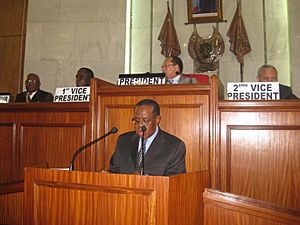Léon Kengo wa Dondo facts for kids
Quick facts for kids
Léon Kengo
|
|
|---|---|

Léon Kengo in the Polish Senate (2008)
|
|
| 12th Prime Minister of Zaire | |
| In office 5 November 1982 – 31 October 1986 |
|
| President | Mobutu Sese Seko |
| Preceded by | N'singa Udjuu Ongwabeki Untubu |
| Succeeded by | Position abolished |
| In office 26 November 1988 – 4 May 1990 |
|
| President | Mobutu Sese Seko |
| Preceded by | Sambwa Pida Nbagui |
| Succeeded by | Lunda Bululu |
| In office 6 July 1994 – 2 April 1997 |
|
| President | Mobutu Sese Seko |
| Preceded by | Faustin Birindwa |
| Succeeded by | Étienne Tshisekedi |
| President of the Senate of Congo | |
| In office 11 May 2007 – 5 April 2019 |
|
| Preceded by | Pierre Marini Bodho |
| Succeeded by | Léon Mamboleo |
| Personal details | |
| Born |
Leon Lubicz
22 May 1935 Libenge (Équateur province), Belgian Congo |
| Political party |
|
| Alma mater | Université libre de Bruxelles (1962–1968, PhD in Law) |
Léon Kengo wa Dondo (born Leon Lubicz; 22 May 1935) is a politician from the Democratic Republic of the Congo. He served as the "first state commissioner," which is like a prime minister, many times under President Mobutu Sese Seko in a country then called Zaire. He was a very important person in the government.
Kengo also believed in economic globalization and free-market ideas. From 2007 to 2019, he was the President of the Senate of the Democratic Republic of the Congo.
Contents
Early Life and Background
Kengo was born in Libenge, which was part of the Belgian Congo at the time. This area is now in the Democratic Republic of the Congo. His father was Polish Jewish, and his mother was Rwandan Tutsi.
In 1971, he changed his name to Kengo wa Dondo. This happened during a time when President Mobutu encouraged people to use African names. This movement was called Authenticité.
Political Career
Kengo started his career in law. In 1968, he became a top lawyer for the Kinshasa Court of Appeal. Later that year, he was promoted to a higher position in the Supreme Court of Justice.
In 1974, a new constitution was created. It changed the country's name to Zaire. This new constitution gave President Mobutu a lot of power. Kengo, as a senior judge, believed that the court system should still be independent.
Serving as Prime Minister
Before becoming prime minister, Kengo was his country's ambassador to Belgium. He served as prime minister for the first time from 1982 to 1986. During this time, he chose skilled experts for important government jobs.
He then worked as the foreign minister from 1986 to 1987. Kengo became prime minister again from 1988 to 1990.
In the early 1990s, Mobutu allowed a temporary parliament to be formed. Kengo was chosen as prime minister again in 1994. He was seen as a way to balance the power of another popular politician, Étienne Tshisekedi.
In December 1996, a civil war began in Congo. Kengo led a special government to try and stop the rebellion led by Laurent Kabila. Some people who supported Mobutu did not trust Kengo because of his Tutsi background. Kabila's rebels were allied with Tutsi governments in Rwanda and Burundi.
As Kabila's armies moved across the country, Kengo was criticized for how the war was going. He announced he would resign in March 1997 and left office in April 1997. The Mobutu government fell a month later, and Kengo stepped away from politics for a while.
President of the Senate
After returning to the Democratic Republic of the Congo, Kengo supported Jean-Pierre Bemba in the 2006 presidential election. However, Bemba lost to President Joseph Kabila.
In January 2007, Kengo was elected as a Senator for Équateur province. On May 11, 2007, Kengo was chosen as the President of the Senate. This was a bit of a surprise because he was an independent candidate. He won with 55 votes against 49 for the other candidate.
Kengo served as Senate president until April 5, 2019.
 | Kyle Baker |
 | Joseph Yoakum |
 | Laura Wheeler Waring |
 | Henry Ossawa Tanner |


